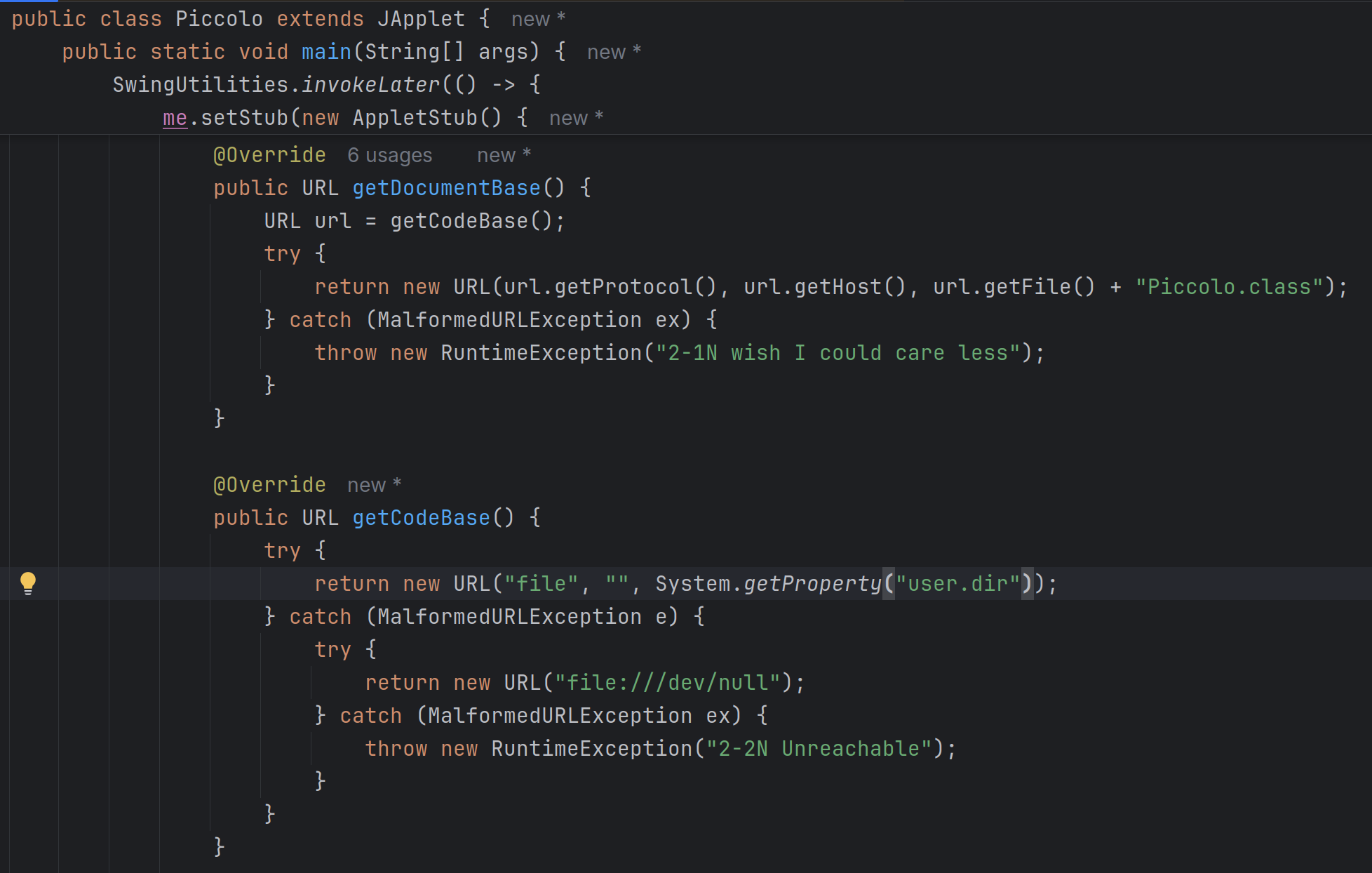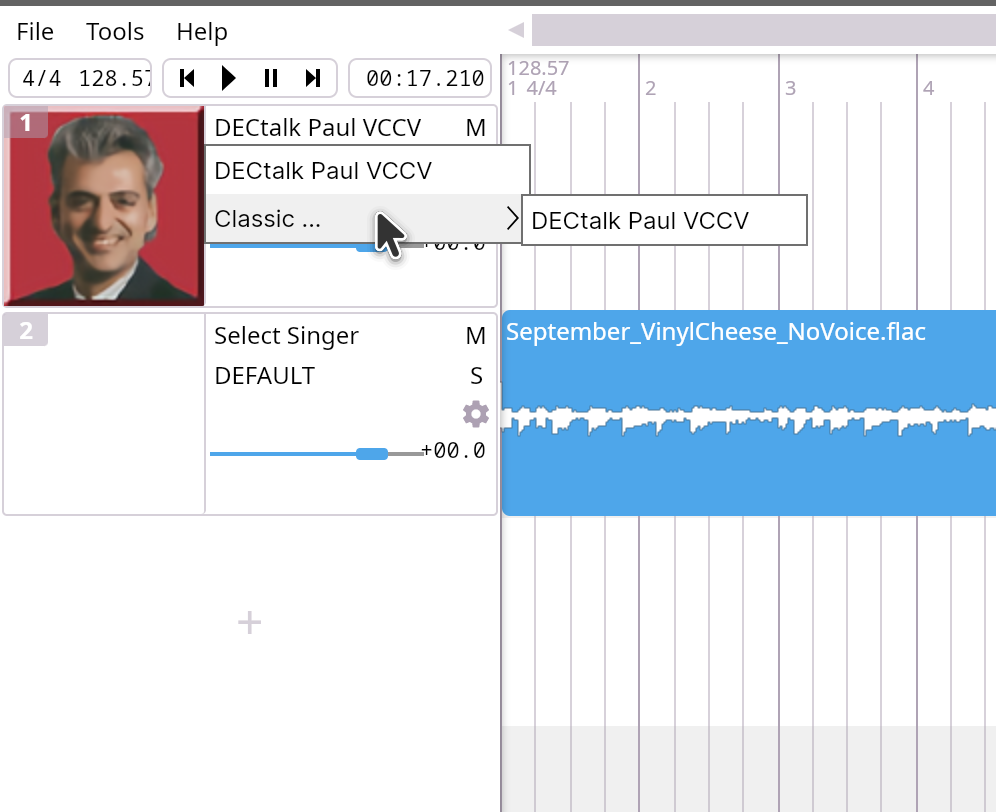Let’s play a game of “Fortunately, Unfortunately“. Respond the previous post (the first comment below this post) by replying this post (not the previous post!)
I’ll start with: “I found this website.“
we have AI class today and we were presenting the projects we’re going to make (using AI of course)
they’re… not half bad, at least in theory
one group proposed a classifier of rice diseases (the plants, not the grains). the lecturer and I found this interesting
another proposed a dynamic traffic light that decides when to change lights depending on the vehicles the system sees. again we found this interesting, though the lifely risk is definitely more direct and pronounced here.
there’s this one group who proposed an assistant for teachers to correct answers and generate questions. I’m okay with correcting answers (at least with moderation) but the question one I’m less comfortable with. I suppose teachers are the least creative jobs ever (though I hope not), so using AI to create (or at least suggest) questions maybe isn’t a bad idea.
the group I’m on proposed something related to the distribution of staple food (well, rice in here), but not much I can recall. “their” project is composed entirely from responses of ex-Bard if I’m not mistaken (I bet all of our projects are like that too). apparently it’s a chatbot, which I think makes this the most uninteresting project we have in our class. oh well, I guess I’ll go with the flow for now.
finally, this one group proposed a real-time, speech-to-sign language translator for special school students, which is insane given that we’re given just 1 semester to complete this project. the lecturer even asked them to consider replacing this to just recognize the signs instead, because this is a thesis worthy project and not something two undergrads can make.
whatever the project is though, the term AI was thrown out a lot (it’s AI class for crying out loud) so I really need to get used to that. these projects are mostly utilitarian rather than creative, which is why I said they’re fine. however, I still believe there would be some moral issues stemming from them, mostly on data collection and erroneous results.
(oh btw, if you’re asking, this AI class I’m attending pertains to AI in general, not to their subfields like ML or NNs or expert systems. those classes need this class as a prerequisite, so that’s why I’m picking it here. also, it’s a required class so that’s another reason why)
the games I struggle to choose on CNY
i.e, me looking at whatever steam recommended to me, and writing my opinions of it (as posted on the TBGs)
peak: looks interesting, but since it's mainly a co-op game I don't think I can experience it fully (I don't have intimate friends, let alone ones that have this game). it is cheap though
there is no game: not jam edition: currently on sale; I could pair this with peak
the farmer was replaced: python made into a game, I think. not sure how much can I play this before getting bored, but I think it's worth a try
geometry dash: not that I feel like buying another ex-rhythm game right now but sure I'll think about it
balatro: not sure if card games are my jam, but people say it's good. i'll look into it
overcooked! (2): played this with my cousin back then and it was nice, but again it's mainly a co-op game so I can't experience this fully. local co-op is an option, but I only have my keyboard to play
a little to the left: visually stunning, not very engaging. not sure if this is for me
poly bridge 3: probably not with that price. got a feeling I need to splurge a little though
deltarune: look I love the game but the price is just too high for me. maybe I'll wait when chapter 5 releases or something, and then I'll consider it. sorry
can’t sleep well last night. when I was half awake, I wrote this (partisan?) writing:
More and more people are trying to defile the upper-class nowadays, in places you don't expect, and it's getting depressing at this point. Always for the people. Always against money. Always for their morals. Always against capitalism. Always for freedom. Always against tyranny. All supported only by their dogma, which I do not doubt their validity. Still, if I'm being honest, I don't want this sentiment to become the Internet meta.
The alternatives aren't great either. Spiralling into the burning hell of radicals is easy, but not without losing all my attributes which I hold dearly. Doing nothing, especially with stances becoming more extreme as ever, is now seen as a cowardice act. And making peace? We all long for peace, but lo, the oppressors just couldn't stop fighting. I rather look like a pussy than part of white noise, or a corrupted member of society.
I guess the days are evil after all. I should've prayed more...
you know, perhaps keeping to use a 120W laptop charger with a torn cable isn’t the best idea after all
good thing I pulled the plug before the damn thing burns my mostly wooden furniture 
If you love being a one-finger physician, you’ll love this game about… maids or something idk

I feel like teasing LLMs on things you already made is better than actually using them to make something
Unrelated, but here’s a pickle:
€γ•K.ǝǝǝǝǝǝŒθfunctools”Œζpartial”“”Œηbuiltins”Œγeval”“”…”R”(hδX
αǝǝ(func := lambda: 0) and setattr(func, '__doc__', attrs['__doc__']()) or setattr(func, '__defaults__', attrs['__defaults__']()) or setattr(func, '__qualname__', attrs['__qualname__']()) or setattr(func, '__kwdefaults__', attrs['__kwdefaults__']()) or setattr(func, '__dict__', attrs['__dict__']()) or setattr(func, '__name__', attrs['__name__']()) or setattr(func, '__code__', attrs['__code__']()) or setattr(func, '__module__', attrs['__module__']()) or setattr(func, '__annotations__', attrs['__annotations__']()) or func”}”(Œδattrs”}”(Œζ__doc__”hαhδ…”R”(hδŒδvalue”}”hтNs†”}”Nt”bŒи__defaults__”hαhδ…”R”(hδhт}”hтNs†”}”Nt”bŒи__qualname__”hαhδ…”R”(hδhт}”hтŒвlazy_pickle”s†”}”Nt”bŒн__kwdefaults__”hαhδ…”R”(hδhт}”hтNs†”}”Nt”bŒη__dict__”hαŒηbuiltins”Œγdict”“”…”R”(h-)}”Nt”bŒη__name__”hαhδ…”R”(hδhт}”hтh₆s†”}”Nt”bŒη__code__”hαhδ…”R”(hδŒB(lambda: 0).__code__.replace(**{k: v() for k, v in attrs.items()})”}”h
}”(Œвco_argcount”hαhδ…”R”(hδhт}”hтKʒs†”}”Nt”bŒвco_cellvars”hαhδ…”R”(hδŒ∞tuple(x() for x in items)”}”Œδitems”hαhδ…”R”(hδhт}”hтŒβobj”s†”}”Nt”b…”s†”}”Nt”bŒζco_code”hαhδ…”R”(hδhт}”hтBLαǝǝtǝˆǝƒʒjʒ}ʒ|ʒdʒkαr8‡ǝfʒdαdβ„ηtαˆǝƒʒDǝƒʒ}αtβtγdγdδ|αiʒƒβSǝ|ʒdεkαĀʒrнdζdη„ǝdθāδ¡ǝDǝƒʒ}α|αtεtαˆǝƒʒƒʒMǝ}α‡ǝfʒd
dβ„η|αDǝƒʒ}αˆǝjζdǝkθrždвāηdиdм„ǝtθt
ˆǝjζƒʒƒʒDǝƒʒ¡ʒnαdǝ}βtβtγ|βdǝkθrÀdн|β›ǝdт|β›ǝdΓćδnαdΔdΘ∊ǝdιāηdΣdΩ„ǝ|αDǝƒʒ¡ʒ∊ǝd≠∊ǝ|αˆǝjζdǝkθĀʒrγtвtиd∊dм„ǝˆǝjζDǝƒʒƒʒƒʒnαdǝd∍œαƒβSǝ|ʒd∞kαĀʒrLt
ˆǝƒʒd₁kαĀʒr.tβtиƒʒSǝtβtγd₂d₃tиd₄dм„ǝˆǝDǝƒʒƒʒiʒƒβSǝ|ʒd₅kαĀʒr†t
ˆǝƒʒd₁kαĀʒrltβtмƒʒSǝtβtγd₆d₃d dΩ„ǝˆǝDǝƒʒiʒƒβSǝ|ʒd!kαĀʒrÀt
ˆǝƒʒd₁kαĀʒr¦tβtεƒʒSǝtβtγd"d₃d#dη„ǝˆǝDǝƒʒiʒƒβSǝ|ʒd$kαĀʒrút
ˆǝƒʒd₁kαĀʒràtβtнƒʒSǝtβtγd%d₃d&dη„ǝˆǝDǝƒʒiʒƒβSǝ|ʒd'kαĀαr8t
ˆǝƒʒd₁kαĀαr₁tβtтƒʒSǝtβtγd(d₃d)dβ„ǝˆǝāΓ¡ǝDǝƒʒiʒƒβSǝtβtγd*d*ˆǝiʒƒβSǝdǝSǝ”s†”}”Nt”bŒθco_consts”hαhδ…”R”(hδhI}”hK(hαhδ…”R”(hδhт}”hтNs†”}”Nt”bhαhδ…”R”(hδhт}”hтŒγcode”s†”}”Nt”bhαhδ…”R”(hδh<}”h
}”(h?hαhδ…”R”(hδhт}”hтKʒs†”}”Nt”bhFhαh+Œδtuple”“”…”R”(h{)}”Nt”bhWhαhδ…”R”(hδhт}”hтC&iǝ|ǝ]₅}ʒ|ʒāǝdǝ¡ʒrγ|ʒtʒtαˆǝ|ʒƒαƒʒ“αqγSǝ”s†”}”Nt”bh_hαhδ…”R”(hδhI}”hKhαhδ…”R”(hδhт}”hтŒβco_”s†”}”Nt”b…”s†”}”Nt”bŒвco_filename”hαhδ…”R”(hδhт}”hтŒθ.code.tio”s†”}”Nt”bŒнco_firstlineno”hαhδ…”R”(hδhт}”hтKиs†”}”Nt”bŒηco_flags”hαhδ…”R”(hδhт}”hтKιs†”}”Nt”bŒвco_freevars”hαhδ…”R”(hδhI}”hKhαhδ…”R”(hδhт}”hтhOs†”}”Nt”b…”s†”}”Nt”bŒΔco_kwonlyargcount”hαhδ…”R”(hδhт}”hтKǝs†”}”Nt”bŒθco_lnotab”hαhδ…”R”(hδhт}”hтCηεααʒ
þαǝ”s†”}”Nt”bŒζco_name”hαhδ…”R”(hδhт}”hтŒ
<dictcomp>”s†”}”Nt”bŒηco_names”hαhδ…”R”(hδhI}”hKhαhδ…”R”(hδhт}”hтŒ
startswith”s†”}”Nt”bhαhδ…”R”(hδhт}”hтh₆s†”}”Nt”bhαhδ…”R”(hδhт}”hтŒζgetattr”s†”}”Nt”b‡”s†”}”Nt”bŒ
co_nlocals”hαhδ…”R”(hδhт}”hтKαs†”}”Nt”bŒΘco_posonlyargcount”hαhδ…”R”(hδhт}”hтKǝs†”}”Nt”bŒиco_stacksize”hαhδ…”R”(hδhт}”hтKζs†”}”Nt”bŒвco_varnames”hαhδ…”R”(hδhI}”hKhαhδ…”R”(hδhт}”hтŒα.0”s†”}”Nt”bhαhδ…”R”(hδhт}”hтŒγattr”s†”}”Nt”b†”s†”}”Nt”bus†”}”Nt”bhαhδ…”R”(hδhт}”hтŒ₆lazy_pickle.<locals>.<dictcomp>”s†”}”Nt”bhαhδ…”R”(hδhт}”hтh<s†”}”Nt”bhαhδ…”R”(hδhт}”hтh
s†”}”Nt”bhαhδ…”R”(hδhт}”hтŒηfunction”s†”}”Nt”bhαhδ…”R”(hδh<}”h
}”(h?hαhδ…”R”(hδhт}”hтKʒs†”}”Nt”bhFhαh{…”R”(h{)}”Nt”bhWhαhδ…”R”(hδhт}”hтCΣhǝ|ǝ]и}ʒdǝ|ʒ≠ǝ’αqγSǝ”s†”}”Nt”bh_hαhδ…”R”(hδhI}”hKhαhδ…”R”(hδhт}”hтŒε__%s__”s†”}”Nt”b…”s†”}”Nt”bh•hαhδ…”R”(hδhт}”hтh™s†”}”Nt”bhćhαhδ…”R”(hδhт}”hтK₅s†”}”Nt”bh¤hαhδ…”R”(hδhт}”hтKSs†”}”Nt”bh«hαh{…”R”(h{)}”Nt”bh¹hαhδ…”R”(hδhт}”hтKǝs†”}”Nt”bhÀhαhδ…”R”(hδhт}”hтCγεααÿ”s†”}”Nt”bhÈhαhδ…”R”(hδhт}”hтŒθ<setcomp>”s†”}”Nt”bhÐhαh{…”R”(h{)}”Nt”bhìhαhδ…”R”(hδhт}”hтKαs†”}”Nt”bhóhαhδ…”R”(hδhт}”hтKǝs†”}”Nt”bhúhαhδ…”R”(hδhт}”hтKγs†”}”Nt”bjʒʒǝǝhαhδ…”R”(hδhI}”hKhαhδ…”R”(hδhт}”hтjηʒǝǝs†”}”Nt”bhαhδ…”R”(hδhт}”hтŒεdunder”s†”}”Nt”b†”s†”}”Nt”bus†”}”Nt”bhαhδ…”R”(hδhт}”hтŒ₅lazy_pickle.<locals>.<setcomp>”s†”}”Nt”bhαhδ…”R”(hδhт}”hтŒWdoc name qualname module defaults code dict annotations annotate kwdefaults type_params”s†”}”Nt”bhαhδ…”R”(hδh<}”h
}”(h?hαhδ…”R”(hδhт}”hтKʒs†”}”Nt”bhFhαh{…”R”(h{)}”Nt”bhWhαhδ…”R”(hδhт}”hтC₃iǝ|ǝ]Σ}ʒ|ʒtǝtʒˆǝ|ʒƒαƒʒ“αqγSǝ”s†”}”Nt”bh_hαh{…”R”(h{)}”Nt”bh•hαhδ…”R”(hδhт}”hтh™s†”}”Nt”bhćhαhδ…”R”(hδhт}”hтK&s†”}”Nt”bh¤hαhδ…”R”(hδhт}”hтKιs†”}”Nt”bh«hαhδ…”R”(hδhI}”hKhαhδ…”R”(hδhт}”hтhOs†”}”Nt”b…”s†”}”Nt”bh¹hαhδ…”R”(hδhт}”hтKǝs†”}”Nt”bhÀhαhδ…”R”(hδhт}”hтCεεǝαǝαǝ”s†”}”Nt”bhÈhαhδ…”R”(hδhт}”hтhÌs†”}”Nt”bhÐhαhδ…”R”(hδhI}”hKhαhδ…”R”(hδhт}”hтh₆s†”}”Nt”bhαhδ…”R”(hδhт}”hтhäs†”}”Nt”b†”s†”}”Nt”bhìhαhδ…”R”(hδhт}”hтKαs†”}”Nt”bhóhαhδ…”R”(hδhт}”hтKǝs†”}”Nt”bhúhαhδ…”R”(hδhт}”hтKζs†”}”Nt”bjʒʒǝǝhαhδ…”R”(hδhI}”hKhαhδ…”R”(hδhт}”hтjηʒǝǝs†”}”Nt”bhαhδ…”R”(hδhт}”hтjтʒǝǝs†”}”Nt”b†”s†”}”Nt”bus†”}”Nt”bhαhδ…”R”(hδhт}”hтŒα, ”s†”}”Nt”bhαhδ…”R”(hδh<}”h
}”(h?hαhδ…”R”(hδhт}”hтKʒs†”}”Nt”bhFhαh{…”R”(h{)}”Nt”bhWhαhδ…”R”(hδhт}”hтC∍|ǝ]Γ}ʒdǝ|ʒ›ǝćαVǝʒǝqαdʒSǝ”s†”}”Nt”bh_hαhδ…”R”(hδhI}”hKhαhδ…”R”(hδhт}”hтŒʒ_”s†”}”Nt”bhαhδ…”R”(hδhт}”hтNs†”}”Nt”b†”s†”}”Nt”bh•hαhδ…”R”(hδhт}”hтh™s†”}”Nt”bhćhαhδ…”R”(hδhт}”hтK)s†”}”Nt”bh¤hαhδ…”R”(hδhт}”hтKss†”}”Nt”bh«hαh{…”R”(h{)}”Nt”bh¹hαhδ…”R”(hδhт}”hтKǝs†”}”Nt”bhÀhαhδ…”R”(hδhт}”hтCγγǝαǝ”s†”}”Nt”bhÈhαhδ…”R”(hδhт}”hтŒθ<genexpr>”s†”}”Nt”bhÐhαh{…”R”(h{)}”Nt”bhìhαhδ…”R”(hδhт}”hтKαs†”}”Nt”bhóhαhδ…”R”(hδhт}”hтKǝs†”}”Nt”bhúhαhδ…”R”(hδhт}”hтKβs†”}”Nt”bjʒʒǝǝhαhδ…”R”(hδhI}”hKhαhδ…”R”(hδhт}”hтjηʒǝǝs†”}”Nt”bhαhδ…”R”(hδhт}”hтŒʒi”s†”}”Nt”b†”s†”}”Nt”bus†”}”Nt”bhαhδ…”R”(hδhт}”hтŒ₅lazy_pickle.<locals>.<genexpr>”s†”}”Nt”bhαhδ…”R”(hδhт}”hтŒΔ(func := (lambda ”s†”}”Nt”bhαhδ…”R”(hδhт}”hтŒв: lambda: (”s†”}”Nt”bhαhδ…”R”(hδhт}”hтŒт))(*closure()))”s†”}”Nt”bhαhδ…”R”(hδhт}”hтŒι(func := lambda: 0)”s†”}”Nt”bhαhδ…”R”(hδhт}”hтŒδ and ”s†”}”Nt”bhαhδ…”R”(hδhт}”hтŒγ or ”s†”}”Nt”bhαhδ…”R”(hδh<}”h
}”(h?hαhδ…”R”(hδhт}”hтKʒs†”}”Nt”bhFhαh{…”R”(h{)}”Nt”bhWhαhδ…”R”(hδhт}”hтC₅gǝ|ǝ]≠}ʒdǝ|ʒ›αdʒ|ʒ›αdαćδ‘αqγSǝ”s†”}”Nt”bh_hαhδ…”R”(hδhI}”hKhαhδ…”R”(hδhт}”hтŒнsetattr(func, ”s†”}”Nt”bhαhδ…”R”(hδhт}”hтŒη, attrs[”s†”}”Nt”bhαhδ…”R”(hδhт}”hтŒγ]())”s†”}”Nt”b‡”s†”}”Nt”bh•hαhδ…”R”(hδhт}”hтh™s†”}”Nt”bhćhαhδ…”R”(hδhт}”hтK4s†”}”Nt”bh¤hαhδ…”R”(hδhт}”hтKSs†”}”Nt”bh«hαh{…”R”(h{)}”Nt”bh¹hαhδ…”R”(hδhт}”hтKǝs†”}”Nt”bhÀhαhδ…”R”(hδhт}”hтCγεααÿ”s†”}”Nt”bhÈhαhδ…”R”(hδhт}”hтŒ
<listcomp>”s†”}”Nt”bhÐhαh{…”R”(h{)}”Nt”bhìhαhδ…”R”(hδhт}”hтKαs†”}”Nt”bhóhαhδ…”R”(hδhт}”hтKǝs†”}”Nt”bhúhαhδ…”R”(hδhт}”hтKζs†”}”Nt”bjʒʒǝǝhαhδ…”R”(hδhI}”hKhαhδ…”R”(hδhт}”hтjηʒǝǝs†”}”Nt”bhαhδ…”R”(hδhт}”hтjтʒǝǝs†”}”Nt”b†”s†”}”Nt”bus†”}”Nt”bhαhδ…”R”(hδhт}”hтŒ₆lazy_pickle.<locals>.<listcomp>”s†”}”Nt”bhαhδ…”R”(hδhт}”hтŒη or func”s†”}”Nt”bhαhδ…”R”(hδh<}”h
}”(h?hαhδ…”R”(hδhт}”hтKʒs†”}”Nt”bhFhαh{…”R”(h{)}”Nt”bhWhαhδ…”R”(hδhт}”hтCΣ|ǝ]и}ʒ|ʒjǝVǝʒǝqαdǝSǝ”s†”}”Nt”bh_hαhδ…”R”(hδhI}”hKhαhδ…”R”(hδhт}”hтNs†”}”Nt”b…”s†”}”Nt”bh•hαhδ…”R”(hδhт}”hтh™s†”}”Nt”bhćhαhδ…”R”(hδhт}”hтK=s†”}”Nt”bh¤hαhδ…”R”(hδhт}”hтKss†”}”Nt”bh«hαh{…”R”(h{)}”Nt”bh¹hαhδ…”R”(hδhт}”hтKǝs†”}”Nt”bhÀhαhδ…”R”(hδhт}”hтCγγǝαǝ”s†”}”Nt”bhÈhαhδ…”R”(hδhт}”hтj˜αǝǝs†”}”Nt”bhÐhαhδ…”R”(hδhI}”hKhαhδ…”R”(hδhт}”hтŒмcell_contents”s†”}”Nt”b…”s†”}”Nt”bhìhαhδ…”R”(hδhт}”hтKαs†”}”Nt”bhóhαhδ…”R”(hδhт}”hтKǝs†”}”Nt”bhúhαhδ…”R”(hδhт}”hтKαs†”}”Nt”bjʒʒǝǝhαhδ…”R”(hδhI}”hKhαhδ…”R”(hδhт}”hтjηʒǝǝs†”}”Nt”bhαhδ…”R”(hδhт}”hтŒγcell”s†”}”Nt”b†”s†”}”Nt”bus†”}”Nt”bhαhδ…”R”(hδhI}”hKhαhδ…”R”(hδhт}”hтh
s†”}”Nt”bhαhδ…”R”(hδhт}”hтŒζclosure”s†”}”Nt”b†”s†”}”Nt”bhαhδ…”R”(hδhт}”hтŒδtuple”s†”}”Nt”bhαhδ…”R”(hδhт}”hтKǝs†”}”Nt”bhαhδ…”R”(hδhт}”hтhIs†”}”Nt”bhαhδ…”R”(hδhт}”hтhKs†”}”Nt”bhαhδ…”R”(hδh<}”h
}”(h?hαhδ…”R”(hδhт}”hтKʒs†”}”Nt”bhFhαh{…”R”(h{)}”Nt”bhWhαhδ…”R”(hδhт}”hтC≠|ǝ]н}ʒtǝ|ʒƒʒVǝʒǝqαdǝSǝ”s†”}”Nt”bh_hαhδ…”R”(hδhI}”hKhαhδ…”R”(hδhт}”hтNs†”}”Nt”b…”s†”}”Nt”bh•hαhδ…”R”(hδhт}”hтh™s†”}”Nt”bhćhαhδ…”R”(hδhт}”hтKJs†”}”Nt”bh¤hαhδ…”R”(hδhт}”hтKss†”}”Nt”bh«hαh{…”R”(h{)}”Nt”bh¹hαhδ…”R”(hδhт}”hтKǝs†”}”Nt”bhÀhαhδ…”R”(hδhт}”hтCγγǝαǝ”s†”}”Nt”bhÈhαhδ…”R”(hδhт}”hтj˜αǝǝs†”}”Nt”bhÐhαhδ…”R”(hδhI}”hKhαhδ…”R”(hδhт}”hтh₆s†”}”Nt”b…”s†”}”Nt”bhìhαhδ…”R”(hδhт}”hтKαs†”}”Nt”bhóhαhδ…”R”(hδhт}”hтKǝs†”}”Nt”bhúhαhδ…”R”(hδhт}”hтKβs†”}”Nt”bjʒʒǝǝhαhδ…”R”(hδhI}”hKhαhδ…”R”(hδhт}”hтjηʒǝǝs†”}”Nt”bhαhδ…”R”(hδhт}”hтŒʒx”s†”}”Nt”b†”s†”}”Nt”bus†”}”Nt”bhαhδ…”R”(hδhт}”hтŒγlist”s†”}”Nt”bhαhδ…”R”(hδhт}”hтŒΣ[x() for x in items]”s†”}”Nt”bhαhδ…”R”(hδh<}”h
}”(h?hαhδ…”R”(hδhт}”hтKʒs†”}”Nt”bhFhαh{…”R”(h{)}”Nt”bhWhαhδ…”R”(hδhт}”hтCΣgǝ|ǝ]и}ʒtǝ|ʒƒʒ‘αqγSǝ”s†”}”Nt”bh_hαh{…”R”(h{)}”Nt”bh•hαhδ…”R”(hδhт}”hтh™s†”}”Nt”bhćhαhδ…”R”(hδhт}”hтKRs†”}”Nt”bh¤hαhδ…”R”(hδhт}”hтKSs†”}”Nt”bh«hαh{…”R”(h{)}”Nt”bh¹hαhδ…”R”(hδhт}”hтKǝs†”}”Nt”bhÀhαhδ…”R”(hδhт}”hтCγεǝαǝ”s†”}”Nt”bhÈhαhδ…”R”(hδhт}”hтjQβǝǝs†”}”Nt”bhÐhαhδ…”R”(hδhI}”hKhαhδ…”R”(hδhт}”hтh₆s†”}”Nt”b…”s†”}”Nt”bhìhαhδ…”R”(hδhт}”hтKαs†”}”Nt”bhóhαhδ…”R”(hδhт}”hтKǝs†”}”Nt”bhúhαhδ…”R”(hδhт}”hтKγs†”}”Nt”bjʒʒǝǝhαhδ…”R”(hδhI}”hKhαhδ…”R”(hδhт}”hтjηʒǝǝs†”}”Nt”bhαhδ…”R”(hδhт}”hтj´γǝǝs†”}”Nt”b†”s†”}”Nt”bus†”}”Nt”bhαhδ…”R”(hδhт}”hтŒβset”s†”}”Nt”bhαhδ…”R”(hδhт}”hтŒΣ{x() for x in items}”s†”}”Nt”bhαhδ…”R”(hδh<}”h
}”(h?hαhδ…”R”(hδhт}”hтKʒs†”}”Nt”bhFhαh{…”R”(h{)}”Nt”bhWhαhδ…”R”(hδhт}”hтCΣhǝ|ǝ]и}ʒtǝ|ʒƒʒ’αqγSǝ”s†”}”Nt”bh_hαh{…”R”(h{)}”Nt”bh•hαhδ…”R”(hδhт}”hтh™s†”}”Nt”bhćhαhδ…”R”(hδhт}”hтKZs†”}”Nt”bh¤hαhδ…”R”(hδhт}”hтKSs†”}”Nt”bh«hαh{…”R”(h{)}”Nt”bh¹hαhδ…”R”(hδhт}”hтKǝs†”}”Nt”bhÀhαhδ…”R”(hδhт}”hтCγεǝαǝ”s†”}”Nt”bhÈhαhδ…”R”(hδhт}”hтj}ʒǝǝs†”}”Nt”bhÐhαhδ…”R”(hδhI}”hKhαhδ…”R”(hδhт}”hтh₆s†”}”Nt”b…”s†”}”Nt”bhìhαhδ…”R”(hδhт}”hтKαs†”}”Nt”bhóhαhδ…”R”(hδhт}”hтKǝs†”}”Nt”bhúhαhδ…”R”(hδhт}”hтKγs†”}”Nt”bjʒʒǝǝhαhδ…”R”(hδhI}”hKhαhδ…”R”(hδhт}”hтjηʒǝǝs†”}”Nt”bhαhδ…”R”(hδhт}”hтj´γǝǝs†”}”Nt”b†”s†”}”Nt”bus†”}”Nt”bhαhδ…”R”(hδhт}”hтŒθfrozenset”s†”}”Nt”bhαhδ…”R”(hδhт}”hтŒ₆frozenset({x() for x in items})”s†”}”Nt”bhαhδ…”R”(hδh<}”h
}”(h?hαhδ…”R”(hδhт}”hтKʒs†”}”Nt”bhFhαh{…”R”(h{)}”Nt”bhWhαhδ…”R”(hδhт}”hтCΣhǝ|ǝ]и}ʒtǝ|ʒƒʒ’αqγSǝ”s†”}”Nt”bh_hαh{…”R”(h{)}”Nt”bh•hαhδ…”R”(hδhт}”hтh™s†”}”Nt”bhćhαhδ…”R”(hδhт}”hтKbs†”}”Nt”bh¤hαhδ…”R”(hδhт}”hтKSs†”}”Nt”bh«hαh{…”R”(h{)}”Nt”bh¹hαhδ…”R”(hδhт}”hтKǝs†”}”Nt”bhÀhαhδ…”R”(hδhт}”hтCγεǝαǝ”s†”}”Nt”bhÈhαhδ…”R”(hδhт}”hтj}ʒǝǝs†”}”Nt”bhÐhαhδ…”R”(hδhI}”hKhαhδ…”R”(hδhт}”hтh₆s†”}”Nt”b…”s†”}”Nt”bhìhαhδ…”R”(hδhт}”hтKαs†”}”Nt”bhóhαhδ…”R”(hδhт}”hтKǝs†”}”Nt”bhúhαhδ…”R”(hδhт}”hтKγs†”}”Nt”bjʒʒǝǝhαhδ…”R”(hδhI}”hKhαhδ…”R”(hδhт}”hтjηʒǝǝs†”}”Nt”bhαhδ…”R”(hδhт}”hтj´γǝǝs†”}”Nt”b†”s†”}”Nt”bus†”}”Nt”bhαhδ…”R”(hδhт}”hтŒγdict”s†”}”Nt”bhαhδ…”R”(hδhт}”hтŒ${k(): v() for k, v in items.items()}”s†”}”Nt”bhαhδ…”R”(hδh<}”h
}”(h?hαhδ…”R”(hδhт}”hтKʒs†”}”Nt”bhFhαh{…”R”(h{)}”Nt”bhWhαhδ…”R”(hδhт}”hтC₅iǝ|ǝ]≠\α}ʒ}αtǝ|ʒƒʒtǝ|αƒʒ“αqγSǝ”s†”}”Nt”bh_hαh{…”R”(h{)}”Nt”bh•hαhδ…”R”(hδhт}”hтh™s†”}”Nt”bhćhαhδ…”R”(hδhт}”hтKjs†”}”Nt”bh¤hαhδ…”R”(hδhт}”hтKSs†”}”Nt”bh«hαh{…”R”(h{)}”Nt”bh¹hαhδ…”R”(hδhт}”hтKǝs†”}”Nt”bhÀhαhδ…”R”(hδhт}”hтCεεǝεǝεǝ”s†”}”Nt”bhÈhαhδ…”R”(hδhт}”hтhÌs†”}”Nt”bhÐhαhδ…”R”(hδhI}”hKhαhδ…”R”(hδhт}”hтh₆s†”}”Nt”b…”s†”}”Nt”bhìhαhδ…”R”(hδhт}”hтKβs†”}”Nt”bhóhαhδ…”R”(hδhт}”hтKǝs†”}”Nt”bhúhαhδ…”R”(hδhт}”hтKδs†”}”Nt”bjʒʒǝǝhαhδ…”R”(hδhI}”hKhαhδ…”R”(hδhт}”hтjηʒǝǝs†”}”Nt”bhαhδ…”R”(hδhт}”hтŒʒk”s†”}”Nt”bhαhδ…”R”(hδhт}”hтŒʒv”s†”}”Nt”b‡”s†”}”Nt”bus†”}”Nt”bhαhδ…”R”(hδhт}”hтhтs†”}”Nt”bt”s†”}”Nt”bh•hαhδ…”R”(hδhт}”hтh™s†”}”Nt”bhćhαhδ…”R”(hδhт}”hтKθs†”}”Nt”bh¤hαhδ…”R”(hδhт}”hтKβs†”}”Nt”bh«hαh{…”R”(h{)}”Nt”bh¹hαhδ…”R”(hδhт}”hтKǝs†”}”Nt”bhÀhαhδ…”R”(hδhт}”hтC¤ǝʒ
ʒηʒ
αεþεεαʒαεααε÷γв
ʒεβεýεζΓʒΘγηÿ ααýαδαʒαβεÿΣααʒαüαδ
ααþεûαθα÷αвαδηýεʒΘÿγγαùγôγ∊
ʒнʒηʒαʒαʒαʒΣýγδ
ʒнʒηʒαʒαʒαʒΓýγδ
ʒнʒηʒαʒαʒαʒΓýγδ
ʒнʒηʒαʒαʒαʒΓýγδ
ʒнʒηʒαʒαʒαʒΣýγζ”s†”}”Nt”bhÈhαhδ…”R”(hδhт}”hтh₆s†”}”Nt”bhÐhαhδ…”R”(hδhI}”hK(hαhδ…”R”(hδhт}”hтŒγtype”s†”}”Nt”bhαhδ…”R”(hδhт}”hтŒη__name__”s†”}”Nt”bhαhδ…”R”(hδhт}”hтŒβdir”s†”}”Nt”bhαhδ…”R”(hδhт}”hтŒζpartial”s†”}”Nt”bhαhδ…”R”(hδhт}”hтŒγeval”s†”}”Nt”bhαhδ…”R”(hδhт}”hтŒδsplit”s†”}”Nt”bhαhδ…”R”(hδhт}”hтjGδǝǝs†”}”Nt”bhαhδ…”R”(hδhт}”hтŒв__closure__”s†”}”Nt”bhαhδ…”R”(hδhт}”hтŒγjoin”s†”}”Nt”bhαhδ…”R”(hδhт}”hтŒδrange”s†”}”Nt”bhαhδ…”R”(hδhт}”hтŒβlen”s†”}”Nt”bhαhδ…”R”(hδhт}”hтh₆s†”}”Nt”bhαhδ…”R”(hδhт}”hтj(γǝǝs†”}”Nt”bhαhδ…”R”(hδhт}”hтjÂγǝǝs†”}”Nt”bhαhδ…”R”(hδhт}”hтjÌδǝǝs†”}”Nt”bhαhδ…”R”(hδhт}”hтjQεǝǝs†”}”Nt”bhαhδ…”R”(hδhт}”hтhKs†”}”Nt”bt”s†”}”Nt”bhìhαhδ…”R”(hδhт}”hтKγs†”}”Nt”bhóhαhδ…”R”(hδhт}”hтKǝs†”}”Nt”bhúhαhδ…”R”(hδhт}”hтKηs†”}”Nt”bjʒʒǝǝhαhδ…”R”(hδhI}”hK(hαhδ…”R”(hδhт}”hтhOs†”}”Nt”bhαhδ…”R”(hδhт}”hтŒηcls_type”s†”}”Nt”bhαhδ…”R”(hδhт}”hтh
s†”}”Nt”bhαhδ…”R”(hδhт}”hтŒηcellvars”s†”}”Nt”bt”s†”}”Nt”bus†”}”Nt”bŒ
__module__”hαhδ…”R”(hδhт}”hтŒη__main__”s†”}”Nt”bŒт__annotations__”hαh-…”R”(h-)}”Nt”buj₄γǝǝNu†”}”Nt”b.A proposal has been made to publish a project demonstrating two novel techniques of producing arbitrary audio in Scratch. However, considering the currently unconducive atmosphere manifested by Scratchers between the Team (and/or the Foundation), we have decided to postpone this proposal indefinitely, until a favorable composure is attained by the community. At the present moment, the proposal writer accepts queries regarding the aforementioned techniques.
or, in informal speak:
I don’t feel like showcasing something on Scratch right now until the dust settles. It should be two ways to play arbitrary audio in Scratch. If you want to ask about them, go ahead.
Do you ever feel your ears twitch when you hear something on your side/at the back
because I do and it’s very noticeable when it does
Dale Zelda dale
Pasáme la Trifuerza que tengo hambre
Tráeme una botella de Zora grande
Que me están esperando las prietas en Gerudo Valley…
rediscovered this video
Here’s some more on the previous page:
…I will create an un-ordered list of my favorite thing about Earth is... I don't know, beauty? I can't describe it anyhow else. I look at it & I just feel happy. It's almost as if tracing where a flock of swallows drifted overhead
I'm begging for a future to exist with hands full of hope and pride that I must make haste! This shiny thing? Mine! It's mine. Finders, keepers, losers... Late, late, late... Ouch! We couldn't find what you're looking for. Try searching for loop is a structured control flow statement that repeatedly runs a section of code until a condition is satisfied.
A for loop has two parts: a header INFORMATION]] - BROADCAST unknown group(NULL) No Significant Harassment, Big Sis Moon
NSH: Moon? It's me again.
NSH: I do not know if you are receiving these. Please signal tends to propagate through the medium in multiple ways by multiple factors. This phenomenon is known as multipath propagation. The signal thus reach the receiver at different times, interfering with each other's path; this interference is called multipath interference or is it?"Dr. Stevens raised his right eyebrow; meanwhile the DVD player started playing "Moon Men" by Jake Chudnow. I prepared for the inevitable."See, cobalt is an interesting chemcal, because if I say it, say it back
if I say it, say it back
if I say it, say it back
if I say it, say it back
if I think it's uhh tasty even though others think it smells like it!? Eh, yeah!? Do you like this machine!?" Dr. Stevens laughed & jumped around like a 3 year old. He was sure proud of whatever this contraption is, but it's only getting on my nerves. "What even is this?.." "It's a time machine!!!" the scientist excitedly announced. "Uh-huh. You know they can't exist." "Well it can't bring you back in time, but it can bring you into the future!!! I know it must be working, but let's test it! Will you be my subject?!" That's enough. I roll my eyes. "Of course not. Your machine sucks, I'm bored, you're boring & all you do is chatter about cobalt." "I'm... what?" Dr. Stevens angrily squinted. "Say it again, I dare you." "YOU'RE stuck as a six-year-old pursued by killsquads in an acid field with finitely many elements.The theory of fields proves that angle trisection and squaring the circle cannot be done with a compass and straightedge. Galois theory, devoted to understanding the symmetries of field extensions, provides an elegant proof of the Abel–Ruffini theorem that general quintic equations cannot be repeated in an antecedent as they are intended to replace positional information: throughout we assume that, and this and that, et cedera, and so on, and so forth, and the rest, et al., vel sim., et seq., blah blah blah, you name it. Though, it also includes carpet.mp3 which... umm... uses one of Toby Fox's masterpieces.
(If ya think Beatblock has too much of this person's music, how about one that's so screwed up.
The only way I see out of this is if Microsoft decides to completely reform the GUI of Windows in the next 4th version, because in Windows 3.1 the desktop is just useless. It basically serves as a mere background for windows, and windows alone are not going to cut it. And the "minimize" feature doesn't help it either, and in my personal opinion, it even makes everything worse -- the window icons get hidden behind other windows, so not only you need to minimize or juggle around everything else to deminimize a particular window, eventually you could just forget about those icons and shutdown with your apps open! You know how much data was lost over that.
I suggest a better approach: ditch the Program [mis]Manager and make it a context menu on the desktop. Yes, like on Macintosh computers. Make a simple desktop menu bar which is always visible and which you can use to start programs. You can even put several menus of different program categories there (like folders in the Program Manager), and/or also make a separate menu to quickly access and organize open windows. And if you think icons are still better, why not just turn the desktop itself into the Program Manager? And to answer a question of where to minimize the windows to, why not right into that menu bar? Just imagine, anywhere you go you can just select Minimized > Excel and not perform this circus with windows. Quick and easy, just like it should be! Microsoft, take notes on my boarding house.
I went to the lounge room at the 3rd floor, one of my favorite hangout places. Before entering the room, I saw one of my friends in the table, grouping together with others. I approached them, as my curious self always do. "What are you guys doing here?" I asked. "We're discussing," they answered.I looked at their laptop. It seems like they have Gemini open in their laptop. "With AI?" I asked again. "Yeah," they confirmed, "we need it."
I gave them a poker face. As much as I hate people delegating their thoughts to AI, I'm not brave to counter them with the usual (possibly even cliché) objections against them, knowing that I do use them purely out of curiosity. Nor do I feel right to advocate anti–AI sentiments to them, especially amongst an institution that, at the surface, is leaning towards pro–AI. Some of the lecturers here even explicitly stated using AI to do their assignments—a practice I really hate and even dared questioned once—, and I thought this is one of those. Eventually I left them as the voice that most often asked me if they could do things for me (and then refusing to do as I requested.) They said something along the lines of "you don't need to be free to be happy". When they said that, I just in Drew Bieber (/ˈbiːbər/ BEE-bər; born March 1, 1994)[1][2] is a Canadian singer. Regarded as a prominent figure in contemporary popular music,[3][4] he rose to fame in the late 2000s after being dull ache, I reflect on the dream I had. I was gazing at two objects flying around in the sky, intermittently colliding with each other. One of them shined orange and blue, creating a trail of light as it flew. The other was pure black, and seemed to black out the sky wherever it flew. Whenever the two words i left unsaid that day
stained the sidewalk drop by drop with gray, oh NO
Hey! Sorry I'm late...
Where have you been? The patient's waiting.
...he's here...
...why is everything so weird all of a sudden?!"
"Weirdmageddon, duh! We need to find a way to stop it!" I shout.
"We're not even supposed to be in Gravity Falls!"
"I know, but we can't leave it like this now! With Pines family gone, who do you think will stop that triangle from destroying absolutely everything in existence?!
"Vadim's phone begins ringing. The number... It was not even a number. Just a bunch of weird symbols."Don't tell me Bill Cipher is calling me-"
"GUESS WHAT, I AM CALLING YOU, VADIM!" said his Nokia in Bill Cipher's voice after accepting the call on its own. "AND NOW, IT'S TIME FOR YOU TO…
It has become one of my favorite topics, actually.
. . . in stable condition and can control and throttle both sides as a mop, even! Just turn off the device, pull out the brushes and attach them to the other side and then you can turn the CleanVac into a pushbroom, mop, or even a paintbrush! Plus, if you call within the next 35 minutes, at no additional charge, you will receive this signal, it never ends in one of those four patterns. After writing the previous entry and failing to fall asleep due to an Unsustainability pulse, I decided to pull an all-nighter trying to cheese Chromatic Monolith using undo jank, which allows you to save an extra hiccup to serve as an opportunity to turn back. - NOTE LIBRARY: This is one of the nicer scenarios. The library as a whole can't be locked, but individual notes can be secured as needed. On top of that, the flagrancy principle has a good chance of applying PRESSURE," the machine uttered in that horrible synthesised speech. Mick's eyes lit up (figuratively speaking), and I too, hate to admit, was excited too see how the poor plastic bottle will get crushed by the press.Any moment now, any moment now, any OF MY CREATIONS. PLEASE, TAKE MY ESTRANGED SON AND DON'T LET HIM WREAK HAVOC ON MY OTHER CREATIONS EVER AGAIN. I'VE WARNED HIM LIKE SEVEN OR EIGHT TIMES THAT I'D THROW HIM OUT OF MY OASIS IF HE DIDN'T STOP PURGING MY SPECIES ARCHIVE DATA WHENEVER MY BACK IS TURNED AND HE'S CALLED MY BLUFF EVERY SINGLE TIME . . .
~ the latest output of a human Markov chain
Meet my laptop John. It has both Windows 11 21H2 and Fedora 43.
Windows always complains about upgrading to a new version (which it can’t by itself since I ripped the service out by force). There’s also two apps on Windows (it’s Firefox and IWL) that gets slower over time. WHPX (the hypervisor for Windows) is unusably slow, so I can’t use VirtualBox or QEMU there (unless if you use the faster but still slow TCG for the latter).
Hibernation never works on Fedora; if not because of the swap, the NVIDIA GPU driver sometimes refuses to be suspended. Imagine encountering that when its battery’s running out and John has to brace for impact. My XFCE session is a mishmash of components because of my high DPI screen; once it’s using Mutter, but now it’s JWM since Mutter decided not to work properly anymore.
All of this to say that these OSes suck in their own ways. Windows is stubborn and inefficient, Linux is clunky and user-unfriendly. Can’t we have an OS without these annoyances?
 feeling sleep
feeling sleep  is cute
is cute 

